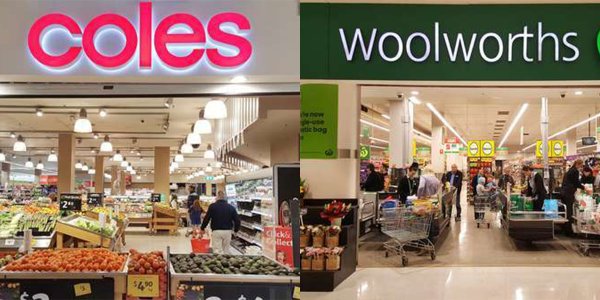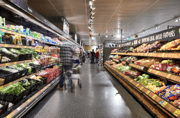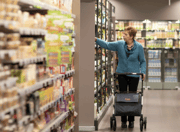Parties double down on call to split Coles, Woolworths duopoly amid soaring supermarket prices
- Replies 61
As we all navigate the ever-tightening squeeze of the cost-of-living crisis, it's become increasingly clear that Australian shoppers are bearing a heavy burden.
Recent reports have highlighted a startling reality about food prices.
The staggering figures have sparked a heated debate about the dominance of Coles and Woolworths in the supermarket sector, and whether it's time to break up their duopoly.
According to Labor MP Andrew Charlton, Aussie shoppers are paying some of the highest prices for food in the developed world as they navigate a cost-of-living crisis.
‘Australians are paying 54 per cent more than the world average for food,’ he said.
This revelation intensified the push on the government to dismantle the dominance of Coles and Woolworths, prompting lawmakers to develop new legislation.

The data from the World Bank is eye-opening, to say the least.
Australians are forking out up to 41 per cent more for meat, 45 per cent more for dairy, and an astonishing 46 per cent more for fruit.
However, the price hikes don't stop there.
Bread costs Australians as much as 73 per cent more, and seafood 63 per cent more.
While for those who enjoy a tipple, beer and wine are up to 85 per cent more expensive Down Under.
Charlton laid the blame for these exorbitant prices at the feet of the major supermarkets and multinational food suppliers.
‘The global executives of these companies call Australia “Treasure Island”,’ he asserted, suggesting they charge premium prices simply because the market allows it.
While Coles and Woolworths report profits exceeding a billion dollars, consumers are struggling to afford their weekly groceries, and farmers are voicing concerns that their prices are being undermined.
In response to this, the Greens introduced a divestiture bill to the Senate, which proposes giving the government the power to dismantle supermarket businesses if they are found to be abusing their market power.
Such divestiture laws are not new concepts, as they are already in place in countries like the United States and the United Kingdom to break up companies that engage in anti-competitive practices across various industries.
Meanwhile, the Nationals and Liberals are crafting their own legislation.
Nationals Leader David Littleproud emphasised a focus on supermarkets, seeking to avoid broader economic repercussions.
‘The bill that the Greens put in place was deficient in design,’ he asserted.
‘We’re very proud of the fact that Peter (Dutton) and the Liberals want to work through this to make sure there are no unintended consequences and there’s fairness in prices from the farm gate to your plate.’
Under the proposed laws, grocery retailers that engage in 'egregious' anti-competitive behaviour could be compelled to sell stores to smaller independents.
However, Littleproud insisted that safety tests must be applied to ensure these actions do not inadvertently harm competition.
‘That makes sure that there is a smaller competitor that can come in and take that,’ he stated.
Despite these legislative efforts, the government expressed reluctance to endorse divestiture proposals for supermarkets, citing potential job losses at some of the nation's largest employers.
Prime Minister Anthony Albanese described the threats to dismantle the big two as akin to 'Soviet-style laws' and instead initiated several inquiries into the pricing practices of Coles and Woolworths.
‘My government’s determined to hold them to account,’ he declared.
 Have you noticed a significant increase in your grocery bills? Do you believe breaking up the supermarket duopoly could lead to fairer prices, or are there other solutions we should explore? Share your thoughts and experiences in the comments below.
Have you noticed a significant increase in your grocery bills? Do you believe breaking up the supermarket duopoly could lead to fairer prices, or are there other solutions we should explore? Share your thoughts and experiences in the comments below.
Recent reports have highlighted a startling reality about food prices.
The staggering figures have sparked a heated debate about the dominance of Coles and Woolworths in the supermarket sector, and whether it's time to break up their duopoly.
According to Labor MP Andrew Charlton, Aussie shoppers are paying some of the highest prices for food in the developed world as they navigate a cost-of-living crisis.
‘Australians are paying 54 per cent more than the world average for food,’ he said.
This revelation intensified the push on the government to dismantle the dominance of Coles and Woolworths, prompting lawmakers to develop new legislation.

The Greens, Nationals, and Liberals are proposing their own laws to counter soaring food prices and address the dominance of Coles and Woolworths in the supermarket landscape. Credits: Shutterstock
The data from the World Bank is eye-opening, to say the least.
Australians are forking out up to 41 per cent more for meat, 45 per cent more for dairy, and an astonishing 46 per cent more for fruit.
However, the price hikes don't stop there.
Bread costs Australians as much as 73 per cent more, and seafood 63 per cent more.
While for those who enjoy a tipple, beer and wine are up to 85 per cent more expensive Down Under.
Charlton laid the blame for these exorbitant prices at the feet of the major supermarkets and multinational food suppliers.
‘The global executives of these companies call Australia “Treasure Island”,’ he asserted, suggesting they charge premium prices simply because the market allows it.
While Coles and Woolworths report profits exceeding a billion dollars, consumers are struggling to afford their weekly groceries, and farmers are voicing concerns that their prices are being undermined.
In response to this, the Greens introduced a divestiture bill to the Senate, which proposes giving the government the power to dismantle supermarket businesses if they are found to be abusing their market power.
Such divestiture laws are not new concepts, as they are already in place in countries like the United States and the United Kingdom to break up companies that engage in anti-competitive practices across various industries.
Meanwhile, the Nationals and Liberals are crafting their own legislation.
Nationals Leader David Littleproud emphasised a focus on supermarkets, seeking to avoid broader economic repercussions.
‘The bill that the Greens put in place was deficient in design,’ he asserted.
‘We’re very proud of the fact that Peter (Dutton) and the Liberals want to work through this to make sure there are no unintended consequences and there’s fairness in prices from the farm gate to your plate.’
Under the proposed laws, grocery retailers that engage in 'egregious' anti-competitive behaviour could be compelled to sell stores to smaller independents.
However, Littleproud insisted that safety tests must be applied to ensure these actions do not inadvertently harm competition.
‘That makes sure that there is a smaller competitor that can come in and take that,’ he stated.
Despite these legislative efforts, the government expressed reluctance to endorse divestiture proposals for supermarkets, citing potential job losses at some of the nation's largest employers.
Prime Minister Anthony Albanese described the threats to dismantle the big two as akin to 'Soviet-style laws' and instead initiated several inquiries into the pricing practices of Coles and Woolworths.
‘My government’s determined to hold them to account,’ he declared.
Key Takeaways
- Australians are paying significantly more for food, with prices soaring above the world average in the midst of a cost-of-living crisis.
- There is growing pressure on the government to address the dominance of Coles and Woolworths, and consider breaking them up to encourage more competition.
- Proposed divestiture laws, similar to those in America and Britain, might give the courts and consumer watchdog the power to break up supermarkets if they misuse their market power.
- Although there were divergent views on the best approach, with safety checks to avoid adverse effects on competition, the government had thus far dismissed divestiture, citing concerns about potential job losses.







